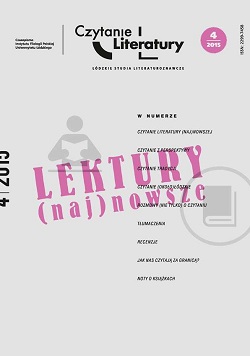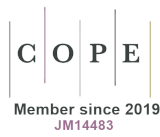Through machine to God. Transhumanism in “Perfekcyjna niedoskonałość” (“Perfect Imperfection”) by Jacek Dukaj
DOI:
https://doi.org/10.18778/2299-7458.04.08Keywords:
Dukaj, trans-humanism, perfect imperfection, artificial intelligence, science fictionAbstract
The text analysis the school of thought called trans-humanism as represented in the novel by Jacek Dukaj “Perfekcyjna niedoskonałość” (Perfect Imperfection). In the first part, the author briefly describes its variations, such as bioethical abolitionism, immortalism and singularitarianism. Moving on to the substance of the novel, the author presents trans-humanist concepts present within it, starting with the anticipated changes in the social hierarchy, methods of education and family relationships, as well as changes in biological aspects of humanity, to the point where ordinary (unimproved) man is left far behind artificial intelligence. The author also points out contemporary concepts that are reflected in the fictional reality, such as post-genderism and risks associated with significant changes in society and system of government. The work concludes with a discussion on the concept of Ultimative Inclusion, which is an achievable stage of development guaranteeing a divine status in our universe.
Downloads
References
Dukaj J., Perfekcyjna niedoskonałość, Kraków 2004.
Google Scholar
Agar N., Thoughts about our species’ future: themes from “Humanity’s End: Why We Should Reject Radical Enhancement”, “Journal of Technology & Evolution”, vol. 21, issue 2, November 2010, s. 23–31.
Google Scholar
DOI: https://doi.org/10.7551/mitpress/9780262014625.001.0001
Agar N., Where to Transhumanism? The Literature Reaches a Critical Mass, „Hastings Center Report” 2007, vol. 37, no. 3, s. 12–17.
Google Scholar
DOI: https://doi.org/10.1353/hcr.2007.0034
Baumann F., Humanism and Transhumanism, „Journal of Technology & So-ciety” 2010, vol. 29, s. 68–84.
Google Scholar
Bostrom N., What is a Singleton?, Oxford 2005.
Google Scholar
Brączyk M., Człowiek na rozdrożu, [w:] Scenariusze przyszłości [seria „Focus. Cywilizacje”], Warszawa 2011, s. 111–118.
Google Scholar
Dukaj J., Moc generowania sensów, „Magazyn Kultury Popularnej Esensja” [wersja elektroniczna dostępna na stronie: http://esensja.stopklatka.pl/ksiazka/wywiady/tekst.html?id=10943&strona=1#strony].
Google Scholar
Evans W., Singularity Warfare, „Journal of Evolution & Technology” 2007, no. 16 (1), s. 161–165.
Google Scholar
Fischer J.M. , Epicureanism About Death and Immortality, „Journal of Ethics” 2006, vol. 10, no. 4, s. 355–381.
Google Scholar
DOI: https://doi.org/10.1007/s10892-006-9004-1
Haraway D., A Cyborg Manifesto: Science, Technology and Socialist-Feminism in the Late Twentieth Century, [w:] taż, Simians, Cyborgs and Women: The Reinvention of Nature, New York 1991.
Google Scholar
Hughes J., Contradictions from the enlightement roots of transhumanism, „The Journal of Medicine and Philosophy” 2010, vol. 35, no. 6, s. 291–316.
Google Scholar
DOI: https://doi.org/10.1093/jmp/jhq049
Hughes J., The Politics of Transhumanism and the Techno-Millenial Imagination, „Zygon: Journal of Religion & Science”, vol. 47, no. 4, December 2012, s. 757–776.
Google Scholar
DOI: https://doi.org/10.1111/j.1467-9744.2012.01289.x
Huxley Julian J., New Bottles for New Wine, London 1957.
Google Scholar
Klichowski Mich M., Narodziny cyborgizacji. Nowa eugenika, transhumanizm i zmierzch edukacji, Poznań 2014.
Google Scholar
Kurzweil R., Nadchodzi osobliwość: Kiedy człowiek przekroczy granice biologii, tłum. E. Chodkowska, A. Nowosielska, Warszawa 2013.
Google Scholar
Latham R., From Outer To Inner Space: New Wave Science Fiction and the Sin-gularity, „Science Fiction Studies” 2012, vol. 39, no. 1, s. 31–41.
Google Scholar
DOI: https://doi.org/10.5621/sciefictstud.39.1.0028
Lem S., Biotechniczna wizja nieśmiertelności [wersja elektroniczna dostępna na stronie: http://www.mp.pl/artykuly/8779].
Google Scholar
Lem S., Dialogi [w serii:] tenże, Dzieła, tom XXXII, Warszawa 2010.
Google Scholar
More M., The Philosophy of Transhumanism [wersja elektroniczna dostępna na stronie: http://media.johnwiley.com.au/product_data/excerpt/99/11183342/1118334299–106.pdf].
Google Scholar
Orliński W., Czarne oceany [recenzja], „Gazeta Wyborcza”, 25.10.2001 [wersja elektroniczna dostępna na stronie: http://wyborcza.pl/1,75517,492967.html].
Google Scholar
Pearce D., Brave New World? A Defence of Paradise-Engineering [wersja el-ektroniczna dostępna na stronie: http://www.huxley.net/].
Google Scholar
Pellissier H., Do All Transhumanists Want Immortality? No? Why Not?, „Futu-rist” 2012, vol. 46, no. 6, [wersja elektroniczna dostępna na stronie: http://www.wfs.org/blogs/hank-pellissier/do-all-transhumanists-want-immortality-no-why-notR].
Google Scholar
Pepperell R., The Posthuman Condition: Consciousness beyond the brain, Bris-tol/Portland 2003.
Google Scholar
Peters T., Progress and Provolution.Will Transhumanism Leave Sin Behind? [w:] Transhumanism and Transcendence. Christian Hope in an Age of Techno-logical Enhancement, ed. R. Cole-Turner. Washington 2011, s. 63–86.
Google Scholar
Uniłowski K., Lord Dukaj albo fantasta wobec mainstreamu, „FA-Art” 2007, nr 4, s. 335–354.
Google Scholar
DOI: https://doi.org/10.1016/B978-343715230-6.50016-5
http://humanityplus.org.
Google Scholar
http://plato.stanford.edu.
Google Scholar
http://www.nytimes.com.
Google Scholar
http://www.sedenko.pl.
Google Scholar
http://www.transcendinggender.org.
Google Scholar
Downloads
Published
How to Cite
Issue
Section
License
Copyright (c) 2015 © Copyright by Beata Atłas-Leśniewicz, Łódź 2015; © Copyright for this edition by Uniwersytet Łódzki, Łódź 2015

This work is licensed under a Creative Commons Attribution-NonCommercial-NoDerivatives 4.0 International License.










